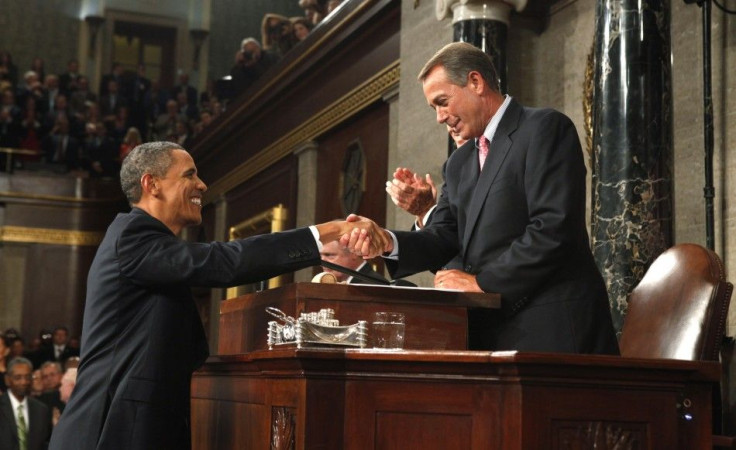Obama Jobs Plan: Republicans Want Tax Cuts, But Not if They're Obama's Idea
OPINION

Republican leaders have officially come out against all of the main proposals in President Obama's jobs plan -- including the tax cuts.
House Speaker John Boehner, Majority Leader Eric Cantor, Majority Whip Kevin McCarthy and Conference Chairman Jeb Hensarling wrote in a memo to all Republican House members on Friday that it was not worth it to cut payroll taxes for middle-class individuals and small businesses in half for 2012 if they would go back up in 2013.
There may be significant unforeseen downsides to large temporary tax cuts immediately followed by large tax increases, the leaders wrote on Friday. We are creating significant new uncertainty in an already uncertain economy.
Of course, this no-temporary-tax-cuts reasoning didn't stop Republicans from approving a temporary extension of the Bush tax cuts -- which are much larger than the ones Obama has proposed -- through 2012. Republicans have also previously advocated for tax cuts for small businesses -- but now that the cuts are Obama's idea, Republicans think they're fiscally irresponsible.
Specifically, Obama has proposed cutting payroll taxes in half in 2012 for workers and small businesses. This is exactly the sort of thing Republicans argue is necessary to provide an incentive for small businesses to hire new employees -- an important goal, given that, as Republican Sen. Chuck Grassley of Iowa rightly noted, small businesses account for the majority of hiring nationwide.
The Republican opposition to other components of Obama's jobs plan is not unexpected. For example, the leaders' memo dismissed the president's proposal to pay for his plan by increasing taxes on wealthy individuals and by closing tax loopholes for oil and gas companies and for corporate jet owners. It also dismissed the idea of spending billions of dollars on school and transportation repairs -- thus creating construction jobs through the same model as President Franklin D. Roosevelt's Works Progress Administration -- and of giving billions more to states to allow them to rehire laid-off teachers, police officers and firefighters. These stances are simply a continuation of Republicans' longstanding opposition to any proposal that involves increasing government revenue or spending.
But the all-or-nothing idea that tax cuts are only worth it if they're permanent is irrational and destructive. The Bush tax cuts -- which differ from Obama's proposed payroll tax cut in that they apply to wealthy Americans rather than the middle class -- played a huge role in turning the Clinton-era surplus into today's staggering deficit. A permanent payroll tax cut is impossible if Republicans refuse to consider reforming the tax code to increase revenues elsewhere, but a temporary cut could go a long way toward getting small businesses hiring again.
If Republicans are really so bound to their rigid anti-tax ideology that they refuse to jump-start the economy with short-term tax cuts that could, God forbid, end at some point in the future, it is very difficult to see how they have the country's best interests at heart.
To be clear, we don't agree with portions of President Obama's proposal, the memo read, and Republicans have a different vision for the steps that need to be taken to help our economy get back to creating jobs.
But if tax cuts for small businesses are now off the table, it's unclear what that different vision is, given that Republicans' own proposals had always involved, well, tax cuts for small businesses.
© Copyright IBTimes 2024. All rights reserved.











